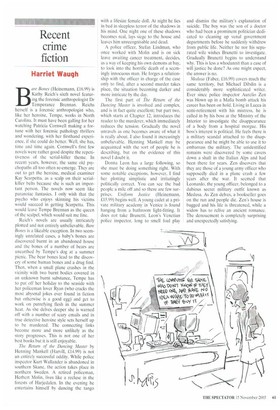Recent crime fiction
Harriet Waugh
Bare Bones (Heinemann, £16.99) is Kathy Reich's sixth novel featuring the forensic anthropologist Dr Temperance Brennan. Reichs herself is a forensic anthropologist who, like her heroine, Tempe, works in North Carolina. It must have been galling for her watching Patricia Cornwell making a fortune with her forensic pathology thrillers and wondering, with her firsthand experience, if she could do better. Well, she has, time and time again. Cornwell's first few novels were rather good despite the repetitiveness of the serial-killer theme. In recent years, however, the same old psychopaths all too often re-emerge. They are out to get the heroine, medical examiner Kay Scarpetta, as a scalp on their serialkiller belts because she is such an important person. The novels now seem like paranoiac fantasies. I only wish that the psycho who enjoys skinning his victims would succeed in getting Scarpetta. This would leave Tempe Brennan as the queen of the scalpel, which would suit me fine.
Reich's novels are usually intricately plotted and not entirely unbelievable. Bare Bones is a likeable exception. In two seemingly unrelated cases, a baby's bones are discovered burnt in an abandoned house and the bones of a number of bears are unearthed by Tempe's dog at a summer picnic. The bear bones lead to the discovery of some human bones and a drug find. Then, when a small plane crashes in the vicinity with two burnt bodies covered in an unknown burnt substance, Tempe has to put off her holiday to the seaside with her policeman lover Ryan (who cracks the most abysmal jokes ever found in fiction but otherwise is a good egg) and get to work on putrefying flesh in the summer heat. As she delves deeper she is warned off with a number of scary emails and in true detective heroine style sets herself up to be murdered. The connecting links become more and more unlikely as the story progresses. This is not one of her best books but it is still enjoyable.
The Return of the Dancing Master by Henning Mankell (Harlin, £14.99) is not an entirely successful oddity. While police inspector Kurt Wallander is abandoned in southern Skane, the action takes place in northern Sweden. A retired policeman, Herbert Molin, lives like a recluse in the forests of Harjedalen. In the evening he entertains himself by dancing the tango with a lifesize female doll. At night he lies in bed in sleepless terror of the shadows in his mind. One night one of these shadows becomes real, lays siege to the house and leaves him unrecognisable and dead.
A police officer, Stefan Lindman, who once worked with Molin and is on sick leave awaiting cancer treatment, decides, as a way of keeping his own demons at bav, to look into the horrific death of a seemingly innocuous man. He forges a relationship with the officer in charge of the case only to find, after a second murder takes place, the situation becoming darker and more intricate by the day.
The first part of The Return of the Dancing Master is involved and complex, and is in fact quite excellent; but part two, which starts at Chapter 12, introduces the reader to the murderer, which immediately reduces the tension. Gradually the novel unravels as one becomes aware of what it is really about. I also found it increasingly unbelievable. Henning Mankell may be acquainted with the sort of people he is describing, but on the evidence of this novel I doubt it.
Donna Leon has a large following, so she must be doing something right. With some notable exceptions. however, I find her plotting simplistic and irritatingly politically correct. You can see the bad people a mile off and so there are few surprises. Uniform Justice (Heinemann, /15.99) begins well. A young cadet at a private military academy in Venice is found hanging from a bathroom light-fitting. It does not take Brunetti, Leon's Venetian police inspector, long to smell foul play and dismiss the military's explanation of suicide. The boy was the son of a doctor who had been a prominent politician dedicated to cleaning up venal government departments before he suddenly withdrew from public life. Neither he nor his separated wife wishes Brunetti to investigate. Gradually Brunetti begins to understand why. This is less a whodunnit than a case of will justice be done? As one might expect, the answer is no.
Medusa (Faber, £16.99) covers much the same territory, but Michael Dibdin is a considerably more sophisticated writer. Ever since police inspector Aurelio Zen was blown up in a Mafia bomb attack his career has been on hold. Living in Lucca in semi-retirement with his mistress, he is called in by his boss at the Ministry of the Interior to investigate the disappearance of a body from a hospital morgue. His boss's interest is political. He feels there is a military scandal attached to the disappearance and he might be able to use it to embarrass the military. The unidentified remains were discovered by some cavers down a shaft in the Italian Alps and had been there for years. Zen discovers that they are those of a young army officer who supposedly died in a plane crash a few years after the war. It seemed that Leonardo, the young officer, belonged to a dubious secret military outfit known as Medusa. As Zen delves, a bookseller goes on the run and people die. Zen's house is bugged and his life is threatened, while a widow has to relive an ancient romance. The denouement is completely surprising and unexpectedly satisfying.


























































































 Previous page
Previous page